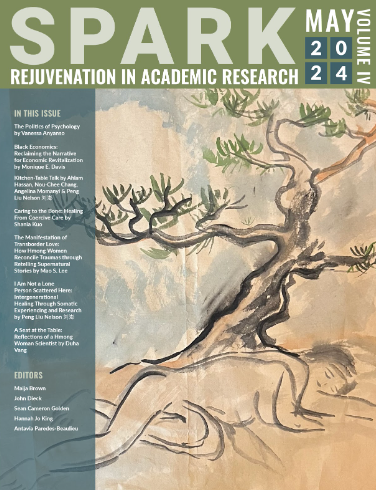Rejuvenation in Academic Research
The Community of Scholars Program is excited to announce the publication of the fourth issue of SPARK, an eZine that amplifies the research, experiences, and voices of graduate researchers who identify as Black, Indigenous, and/or people of color (BIPOC).
Each of the research stories, shared in this issue, stimulates new ways of making academic scholarship relevant to our communities and beyond. Collectively, these research stories are animated by the multifaceted ways COSP Scholars are transforming what scholarship looks like, how knowledge is produced, and for whom scholarship is directed.
Initiated by the COSP Writing Initiative in 2020 and led by the SPARK Editorial Board, SPARK is committed to developing writers through a collaborative approach to publishing research. The editorial process is intent on not reproducing the systemic violence(s) often encountered by writers who come from underrepresented identities in predominantly white academic institutions. The SPARK Editorial Board holds a fierce respect for the writers’ intentions, and the integrity of ideas, experiences, and creative form each writer brings to the community.
In The Politics of Psychology, Vanessa Anyanso calls attention to the ways in which her call to community activism and organizing in 2020 provided purpose to her research as a Black Ph.D. student in psychology and clinician, during the period of unrest in Minneapolis after the murder of George Floyd. Anchored in Black feminist thought, Anyanso shares her journey of transitioning from a paradigm of providing care for the individual to equally focus on the social conditions and systems which influence outcomes for patients. Anyanso demonstrates how rejuvenation, when grounded in a politics of love and community care, can be transformative, both individually and for the field of psychology. Anyanso ends her piece with an immersive photo journal, capturing both the destruction and community care that came out of the unrest.
In Black Economics: Reclaiming the Narrative for Economic Revitalization, Monique E. Davis provides a call to action for Black economic prosperity. Beginning her piece with the ways in which economically thriving Black communities in the early 20th century faced discriminatory practices and policies and state sanctioned violence, Davis also draws attention to the harmful ways in which the traditional teachings within the field of economics privileges positivism while simultaneously devaluing forms of knowledge that are experiential and value based. Bringing attention to the ways Black communities face systemic economic racism, Davis’s call for Black Economics takes into account the pervasive biases that hinder Black prosperity.
In Kitchen-Table Talk, authors Ahlam Hassan, Nou-Chee Chang, Angelina Momanyi and Peng Liu Nelson, creatively explore the theme of rejuvenation through their shared academic labor in their small writing group. Using the metaphor of the kitchen, the piece highlights their experiences as a group of four women of color, carving out a space for themselves to thrive as emerging researchers. Through collaboration, radical honesty, laughter, productive friction, and fermentation of ideas, the piece theorizes alternative practices to the demands of academic labor and productivity in ways that serve as models for collective empowerment and growth.
Caring to the Bone, a two part podcast by Shania Kuo, uses auto ethnography to recount her experiences as a caregiver. In episode I, Kuo explores the affective dimensions of caregiving while providing care to her dying Taiwanese immigrant grandparents. Looking at care through the lens of coercion, Kuo’s piece asks listeners to grapple with the toll of caregiving within capitalist structures that turn familial relationships into commodified practices of care. In her second episode, Kuo addresses an alternative to coercive care, one that is rooted in a social culture of care. Importantly, Kuo brings attention to the health impacts that caregivers face while also making visible the fact that caregivers themselves both need and deserve care.
In Mao S. Lee’s The Manifestation of Transborder Love: How Hmong Women Reconcile Traumas Through Retelling Supernatural Stories, Lee connects her personal health journey and encounters with her familial ancestors to her research of Hmong refugee women in Thailand. Using a Hmong-centric perspective to understand the ways in which violence and capitalism are embedded in the supernatural stories of the Hmong women she interviewed, Lee introduces how transborder love binds together ancestors with the living, through love as a powerful force of healing.
In I Am Not a Lone Person Scattered Here: Intergenerational Healing Through Somatic Experiencing and Research, Peng Liu Nelson recounts her experience as a participant in an eight week somatic experiencing educational workshop. Encountering the presence of her deceased grandmother during one of the activities, Nelson foregrounds the centrality of the body and embodied research to connect her own sense of displacement as a Chinese-born American to the history of dispossession and displacement of Indigenous peoples in the United States.
Lastly, in A Seat at the Table: Reflections of a Hmong Woman Scientist, Duha Vang shares the ways in which her cultural upbringing as a Hmong woman and her training as a Ph.D. researcher in the Molecular, Cellular, Developmental Biology and Genetics Program inform her identity as an emerging scientist. Foregrounding the experiences of her family as Hmong refugees in the United States, and the traditional gender roles for Hmong women, Vang describes the learning and unlearning she’s encountered within science spaces, while taking pride in her cultural heritage.
Enjoy this issue!
